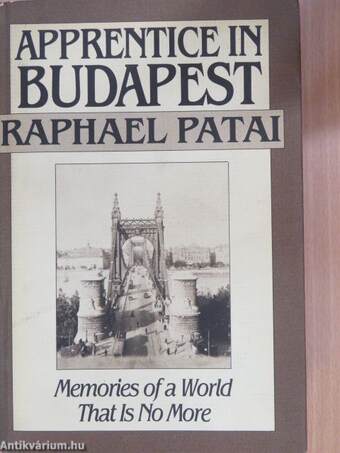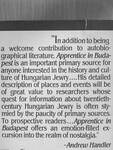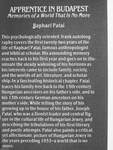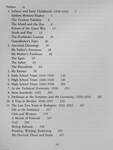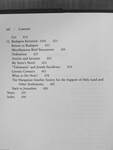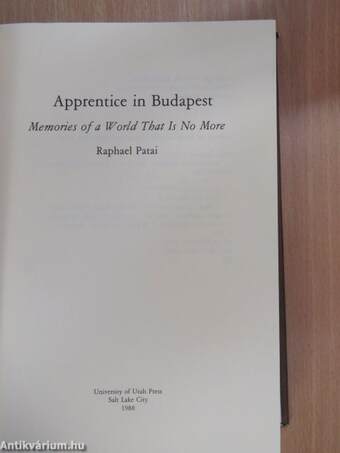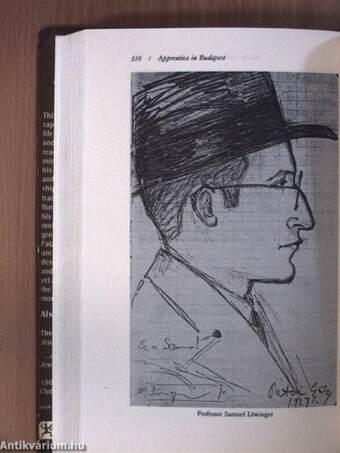1.067.081
kiadvánnyal nyújtjuk Magyarország legnagyobb antikvár könyv-kínálatát

VISSZA
A TETEJÉRE
JAVASLATOKÉszre-
vételek
Apprentice in Budapest
Memories of a World That Is No More
| Kiadó: | University of Utah Press |
|---|---|
| Kiadás helye: | Salt Lake Sity |
| Kiadás éve: | |
| Kötés típusa: | Vászon |
| Oldalszám: | 526 oldal |
| Sorozatcím: | |
| Kötetszám: | |
| Nyelv: | Angol |
| Méret: | 24 cm x 15 cm |
| ISBN: | 0-87480-287-3 |
| Megjegyzés: | Néhány fekete-fehér fotóval, illusztrációval. |
naponta értesítjük a beérkező friss
kiadványokról
naponta értesítjük a beérkező friss
kiadványokról
Fülszöveg
In addition to being
a welcome contribution to autobio-
graphical literature, Apprentice in Buda-
pest is an important primary source for
anyone interested in the history and cul-
ture of Hungarian Jewry His detailed
description of places and events will be
of great value to researchers whose
quest for information about twentieth-
century Hungarian Jewry is often sty-
mied by the paucity of primary sources.
To prospective readers Apprentice in
Budapest offers an emotion-filled ex-
cursion into the realm of nostalgia."
-Andrew Handler
APPRENTICE IN BUDAPEST
Memories of a World That Is No More
Raphael Patai
This psychologically oriented, frank autobiog- '
raphy covers the first twenty-two years of the
life of Raphael Patai, famous anthropologist
and biblical scholar. His astounding memory
reaches back to his first year and goes on to illu-
minate the steady widening of his horizons as
his interests came to include family, society,
and the worlds of art,... Tovább
Fülszöveg
In addition to being
a welcome contribution to autobio-
graphical literature, Apprentice in Buda-
pest is an important primary source for
anyone interested in the history and cul-
ture of Hungarian Jewry His detailed
description of places and events will be
of great value to researchers whose
quest for information about twentieth-
century Hungarian Jewry is often sty-
mied by the paucity of primary sources.
To prospective readers Apprentice in
Budapest offers an emotion-filled ex-
cursion into the realm of nostalgia."
-Andrew Handler
APPRENTICE IN BUDAPEST
Memories of a World That Is No More
Raphael Patai
This psychologically oriented, frank autobiog- '
raphy covers the first twenty-two years of the
life of Raphael Patai, famous anthropologist
and biblical scholar. His astounding memory
reaches back to his first year and goes on to illu-
minate the steady widening of his horizons as
his interests came to include family, society,
and the worlds of art, literature, and scholar-
ship. In a fascinating historical chapter, Patai
traces his family tree back to the 15th-century
Hungarian ancestors on his father's side, and to
his 13th-century German ancestors on his
mother's side. While telling the story of his
growing up in the house of his father, Joseph
. Patai, who was a Zionist leader and central fig-
\ ure in the cultural life of Hungarian Jewry, and
i describing the tribulations of his first literary
and poetic attempts, Patai also paints a critical,
yet affectionate, picture of Hungarian Jewry in
the years preceding 1933-a world that is no
more. Vissza
Témakörök
- Idegennyelv > Idegennyelvű könyvek > Angol > Szépirodalom > Regény, novella, elbeszélés
- Idegennyelv > Idegennyelvű könyvek > Angol > Művelődéstörténet
- Idegennyelv > Idegennyelvű könyvek > Angol > Történelem > Egyéb
- Művelődéstörténet > Eszmetörténet > Tudományok
- Szépirodalom > Regény, novella, elbeszélés > Tartalom szerint > Földrajzi besorolások > Magyarország > Budapest
- Szépirodalom > Regény, novella, elbeszélés > Tartalom szerint > Családregények
- Szépirodalom > Regény, novella, elbeszélés > Tartalom szerint > Társadalmi csoportok > Kisebbségek > Zsidóság
- Történelem > Idegennyelvű > Angol
- Történelem > Egyéb
- Szépirodalom > Regény, novella, elbeszélés > Az író származása szerint > Magyarország
- Szépirodalom > Regény, novella, elbeszélés > Tartalom szerint > Életrajzi regények > Önéletrajzok, naplók, memoárok
- Szépirodalom > Regény, novella, elbeszélés > Tartalom szerint > Kor- és társadalomrajz
Raphael Patai
Raphael Patai műveinek az Antikvarium.hu-n kapható vagy előjegyezhető listáját itt tekintheti meg: Raphael Patai könyvek, művekMegvásárolható példányok
Nincs megvásárolható példány
A könyv összes megrendelhető példánya elfogyott. Ha kívánja, előjegyezheti a könyvet, és amint a könyv egy újabb példánya elérhető lesz, értesítjük.



